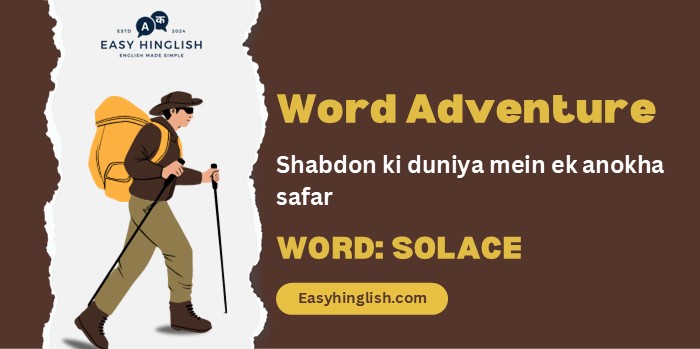Word Adventure: Solace
The Headline
“Solace: Chaotic World Mein Comfort Ki Gentle Art”
The Scoop
Life ki turbulent journey mein, hum sab encounter karte hain moments of sorrow, distress, ya disappointment. In challenging times ke dauran, hum seek karte hain kuch aisa jo ease kar de hamarre troubled hearts ko – hum seek karte hain solace. Yeh powerful word represent karta hai sirf comfort nahi, balki ek particular kind of consolation jo soothe karta hai hamari deepest pains ko. Chaliye explore karte hain iss beautiful concept ko jo provide kar chuka hai linguistic refuge troubled souls ko throughout centuries.
Let’s Break It Down
The Plot Thickens
‘Solace’ ki journey begin hoti hai ancient Rome mein Latin word ‘solacium’ (comfort) aur ‘solari’ (to console) ke saath. Yeh English mein enter hua 13th century mein through Old French as ‘solas’, initially carry kar raha tha meanings of both comfort aur pleasure ya enjoyment.
Time ke saath, solace ka meaning narrow ho gaya to focus specifically on comfort during hardship rather than general delight. Yeh semantic evolution reflect karta hai deep human truth – ki comfort jo humein chahiye hamari darkest hours mein woh distinct hai everyday pleasures se.
Jo cheez ‘solace’ ko particularly poignant banati hai woh hai iska subtle distinction from similar terms. ‘Comfort’ ke unlike, jo ho sakti hai physical as well as emotional, solace specifically address karta hai emotional ya spiritual suffering. Aur ‘consolation’ ke unlike, jo kabhi suggest kar sakti hai compensation for loss, solace focus karta hai alleviation of distress itself par. Yeh nuances make karte hain ‘solace’ ko irreplaceable part hamari emotional vocabulary ka.
Word in the Wild
The Twist
Yahan ek intriguing aspect hai ‘solace’ ka: jabki yeh primarily associated hai finding comfort after tragedy ya disappointment ke saath, psychologists suggest karte hain ki hamari sources of solace reveal karte hain profound truths about our values aur identity. Someone jo solace find karta hai nature mein woh might hold different core values than someone jo solace find karta hai community ya creative expression mein. Iss way mein, solace ka concept sirf iss baare mein nahi hai ki kya helps us feel better – yeh hai window into what we find meaningful at the deepest level. Shayad by reflecting on what provides us solace, hum gain kar sakte hain insights into who we truly are!
Make It Stick
Solace: Jab comfort wrap kar de tumhara wounded heart ek linguistic blanket mein!
Your Turn
Socho ki kya bring karta hai tumhe solace during difficult times. Kya hai woh – music, nature, books, conversation with a trusted friend, ya kuch entirely different? Kya tumhara source of solace change hua hai throughout different phases of your life? Share karo apne thoughts comments mein. Chaliye explore karte hain ki kaise yeh universal human need manifest hoti hai uniquely in each of our lives!
Down the Rabbit Hole
- Curious ho other comfort-related words ke baare mein? Explore karo ‘succor’, ‘balm’, ya ‘consolation’.
- Interested ho psychological perspectives on coping mein? Research karo ‘resilience’, ‘post-traumatic growth’, ya ‘meaning-making’.
- Chahte ho discover karna ki different cultures kaise approach karte hain solace? Look into practices like Japanese ‘kintsugi’, Danish ‘hygge’, ya indigenous healing ceremonies.
The Last Word
Jaise hi hum conclude kar rahe hain apna exploration of ‘solace’, mujhe umeed hai ki tumhe deeper appreciation mili hai iss gentle yet powerful word ki. Ek aisi duniya mein jo often seems chaotic aur challenging, solace ka concept remind karta hai humein hamari shared humanity ki – hamari universal need for comfort aur hamari remarkable capacity to provide it to others. Next time jab tum experience karo ya offer karo solace, remember karo ki tum participate kar rahe ho humanity ki sabse ancient aur necessary traditions mein se ek mein. Until our next word adventure, yeh hai Prashant from Wordpandit, encouraging kar raha hun tumhe both seek aur provide karne ke liye solace iss beautiful, complex world mein jo hum share karte hain!








